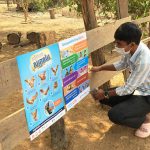Media Centre - Media release - 22 July 2020
Fears for millions of girls and women as new report shows rapidly escalating rates of gender-based violence in the Asia-Pacific
Plan International and Save the Children are calling for urgent intervention to address spiralling rates of violence against girls and women in the Asia-Pacific region as COVID-19 intensifies and lockdowns continue.
The agencies have today joined forces to launch the Because We Matter report, a call to action for leaders and governments to take immediate and decisive action to protect girls and women.
Asia is home to more than half of the world’s 1.1 billion girls. The Because We Matter analysis of the latest data – including from domestic violence helplines – shows that since the outbreak of COVID-19, violence against girls and women, particularly domestic violence, has intensified.
In India, as the country surpasses one million infections and lockdowns continue to fuel tensions in the home. A national hotline received 92,000 calls just during the first 11 days of lockdown.
In Nepal, 37 per cent of respondents to a survey said violence against children had increased directly due to the COVID-19 lockdown.
In similar assessments with children in Bangladesh, the majority of which were girls from poor urban slums and rural communities, children told researchers they had been subject to more physical and humiliating punishment at home.
Plan International Australia’s CEO Susanne Legena described the situation in the Asia-Pacific as ‘incredibly dangerous’ and warned without an urgent commitment from governments, millions of girls will suffer and many will die.
“COVID-19 has affected all of us, but for the world’s most vulnerable, it’s a living nightmare. The potent combination of mass unemployment, financial stress and families confined to small and often overcrowded homes means we have already seen a huge increase in gender based-violence in the region,” Ms Legena said.
“The consequences of the lockdown for girls are severe, as they are often forced out of education and into a life of poor prospects, with increased risk of exposure to violence, abuse, rape and early pregnancy, which is the number one killer of adolescent girls worldwide.
“Economic pressure on families from the pandemic also heightens the potential of girls being exploited for economic reasons, either through early and forced marriage or by being exploited for sex. This pandemic is already unravelling so many hard-won gains in girls’ rights, we cannot stand to lose more.”
Ms Legena added that the pandemic has also resulted in a disturbing increase in online violence against girls. In the Philippines, the government recorded close to 280,000 cases of cybersex trafficking against children from 1 March to 24 May this year – almost four times as many as in 2019.
“As quarantine means children spend more time online to access their education, social media and for entertainment, they are increasingly exposed to cyberbullying, harmful content and sexual exploitation,” Ms Legena said.
“We need authorities and governments to understand that violence against women and girls exists in all spaces, and that includes online.”
Save the Children Australia Deputy CEO and International Programs Direct Mat Tinkler, said: “Globally there are still more than a billion children out of school due to COVID-19, about half of whom are in the Asia-Pacific.
“School is one of the best protective mechanisms we have against domestic violence – teachers can check on the wellbeing of children and act as a referral pathway. We have serious concerns that out-of-school girls will be more likely to experience violence or abuse at the hands of relatives or neighbours.
“These girls are then far less likely to return to school once they re-open, impacting their entire futures. We cannot allow COVID-19 to take away the basic rights of children. Australia and other donors need to step up in Asia and the Pacific.”
- ensuring COVID-19 responses do not compromise or reduce investments in girls rights
- preventing the escalation of harmful gender norms
- ensuring the protection of girls and young women is centred in COVID-19 responses
- upholding protection services and ensuring there are clear ways to report violence and the including girls and young women in decision-making processes.
Additional notes for editors
- Globally, 243 million girls and women aged 15-49 have been subjected to sexual and/or physical violence over the previous 12 months including more than 37% of all women in South Asia and 40 per cent in South-East Asia.
- For every three months the lockdown continues globally, an extra 15 million gender-based violence cases are expected. Another study estimates that domestic violence against children globally is likely to rise by 20 to 32 per cent during quarantine, affecting some 85 million boys and girls.
- There are concerns that between 53 and 85 million children experienced violence over the initial 3-month period of the lockdown.
- South Asia remains home to more than 40 per cent of all child brides globally. COVID-19 will hamper these efforts, potentially resulting in an additional 13 million child marriage cases worldwide between 2020 and 2030, as per UNFPA predictions.
Media contacts


